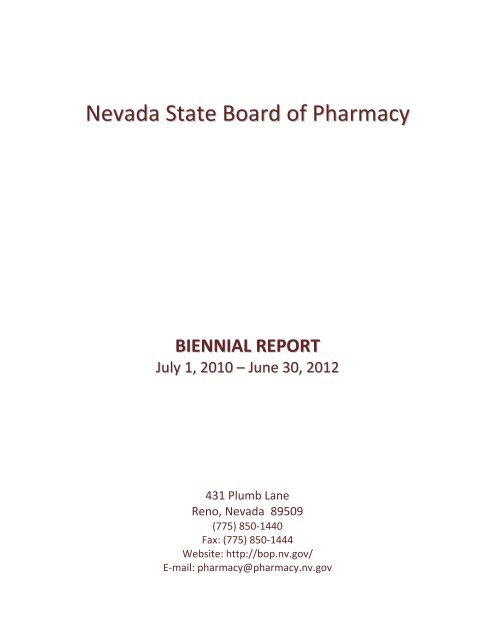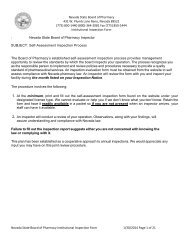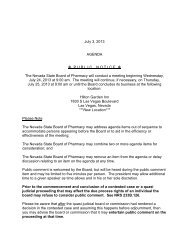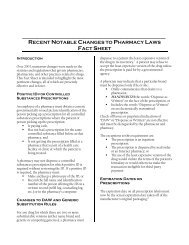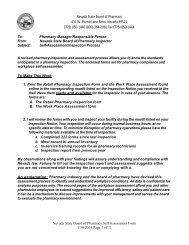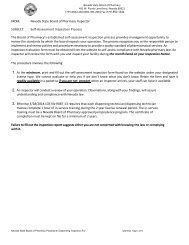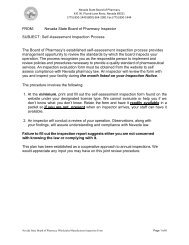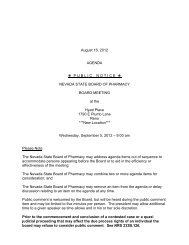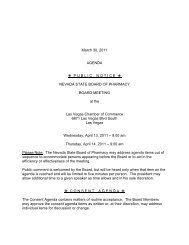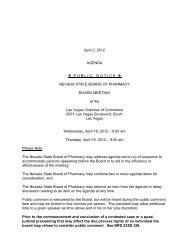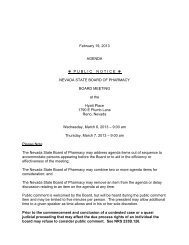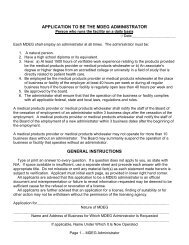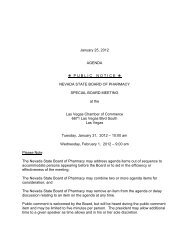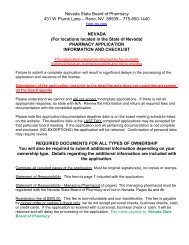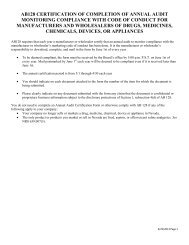Biennial Report - July 1, 2010 - June 30, 2012 - Nevada State Board ...
Biennial Report - July 1, 2010 - June 30, 2012 - Nevada State Board ...
Biennial Report - July 1, 2010 - June 30, 2012 - Nevada State Board ...
- No tags were found...
Create successful ePaper yourself
Turn your PDF publications into a flip-book with our unique Google optimized e-Paper software.
o The <strong>Board</strong> wishes to welcome the following individuals to the <strong>Board</strong> staff.• Jenine Davis Jenine began working with the <strong>Board</strong> as an Intervention officer in August, 2008.Since January 2011 Jenine has also worked with the controlled substance taskforce and as an inspector.Jenine’s background includes working as a detective with the <strong>Nevada</strong>Department of Public Safety, Investigative Division and as an assistant controlledand internal auditor.• Ken Scheuber Ken began his service as an Investigator with the <strong>Board</strong> March 1 st , 2011.Ken’s background includes working in retail drug sales for 38 years in suchdiverse positions as store manager, national product manager, director of storedevelopment and district manager.• Luis Curras Luis began his service with the <strong>Board</strong> in <strong>June</strong>, <strong>2012</strong>.Luis’s background includes working at Sunrise Hospital for the last five yearsincluding as a staff pharmacist responsible for various medical floors, ICU,emergency room and charge pharmacist. Luis worked as a clinical supervisor thelast 18 months he worked at Sunrise. Prior to Sunrise Luis worked at North VistaHospital and Valley Hospital and was Director of Pharmacy at Nathan AdelsonHospice.• Shirley HuntingShirley joined the <strong>Board</strong> Reno staff in <strong>July</strong>, <strong>2012</strong>. Shirley will be assuming JeriWalter’s role as <strong>Board</strong> coordinator when Jeri retires in December, <strong>2012</strong>.Shirley’s background includes working for Magellan Medicaid Administration as apharmacy program support assistant, First Health Services as an administrativeassistant and Washoe Medical Center as Secretary to the Director of Pharmacy.o The <strong>Board</strong> also wants to thank and acknowledge the <strong>Board</strong> staff for sharing theirknowledge and time in the training of the new staff members. The dedication of eachstaff member has made the transition efficient and transparent.<strong>2010</strong>-<strong>2012</strong> <strong>Nevada</strong> <strong>State</strong> <strong>Board</strong> of Pharmacy <strong>Biennial</strong> <strong>Report</strong> Page 6
LICENSURE REPORTThe <strong>Board</strong> issues and regulates the following license or registration categories. The <strong>Board</strong>’s totallicensure counts at the end of the <strong>2010</strong>-<strong>2012</strong> biennium (as of <strong>July</strong> 1, <strong>2012</strong>) are shown in the followingtable.License or Registration CategoryIn <strong>State</strong>Out of<strong>State</strong>TotalControlled Substances Registrations 9,270 0 9,270Dispensing Practitioners 326 0 326Dispensing Technicians and Trainees 369 0 369Interns 382 311 693Manufacturers 3 0 3Medical Devices, Equipment, & Gases 502 207 709Pharmaceutical Technicians & Technicians in Training 5,168 4<strong>30</strong> 5,598Pharmacies ( Includes Institutional Hospitals and Ambulatory587 590 1,177Surgery Centers)Pharmacists 2,159 6,089 8,248Prescribing Practitioners 326 0 326Veterinary Drug Supplier 5 0 0Warehouses 6 0 6Wholesalers 32 677 709TOTALS 19,063 8,313 27,376HEARINGS – LICENSES GRANTED DURING THE BIENNIUMLicense Type In <strong>State</strong> Out of <strong>State</strong>Controlled Substance 1,480 0Intern 149 82Manufacturer 2 0MDEG (Medical Devices/Equipment and334 338Gases)Pharmacy Technician and Trainees 2,003 179Pharmacist 209 207Pharmacy 39 169Practitioner Dispensing 113 0Prescribing Practitioners (APN’s and PA’s) 93 0Technician Dispensing & Trainees 265 0Veterinary Drug Supplier 3 0Warehouse 0 0Wholesaler 10 183<strong>2010</strong>-<strong>2012</strong> <strong>Nevada</strong> <strong>State</strong> <strong>Board</strong> of Pharmacy <strong>Biennial</strong> <strong>Report</strong> Page 7
HEARINGS – DISCIPLINELicense Type RevocationsDeniedApplication Suspension Probation ReinstatedDenial ofReinstatementSurrender ofRegistrationPharmacy 0 2 0 0 0 0 0Pharmacist 5 3 1 3 3 3 1Technician/Technician inTraining 28 15 2 1 3 2 0Other Discipline (see note) Pharmacists Pharmacies21 17Your Success Rx (see Your Success Rx)Other Discipline numbers are noted only once per entity or person. Administrative orders may have other disciplinecomponents as part of the order. If discipline is noted in a specific classification in this chart, the discipline is not noted inthe category “other discipline”. If a pharmacy was ordered by the <strong>Board</strong> to attend Your Success Rx, discipline is noted bothin this chart and separately under Your Success Rx.PractitionersLicenseControlled Substance Controlled Substance Controlled SubstanceDispensing DeniedRestrictedProbationSurrendered1 2 1 2COMPREHENSIVE REVIEW OF REGULATIONSo Pursuant to Governor Sandoval's Executive Order (2011-01) to complete acomprehensive review of the regulations of the <strong>State</strong> <strong>Board</strong> of Pharmacy with respect tothe protection of the public's health, safety and welfare without discouraging economicgrowth, we offer the following report:o As a general statement, the <strong>Board</strong> of Pharmacy feels that the regulations subject to ourenforcement has been, is, and always will be a non-static "working" set of regulationsthat have been constantly and appropriately amended to reflect the ever changingrealm and technological advances within our scope. The world of medicine and theutilization of medications therein, are in a constant state of flux and most often for thebetter. The <strong>Board</strong> of Pharmacy takes its regulatory responsibility seriously, andcontinuously reviews all of its regulations, oftentimes at the request of industry whoneeds regulatory change to progress their businesses. Many times a balance must besought between the good and the evil of drug therapy, as is evidenced by our country'salarming epidemic of prescription drug abuse. Regardless of our ever changingenvironment, the <strong>Board</strong> of Pharmacy takes pride in being one of the most efficientlicensing boards in the nation with respect to swiftly, accurately and safely processingnew applications for any of our 17 different licensing categories, including the licensingof new business entities in <strong>Nevada</strong> (i.e. pharmacies, wholesalers, manufacturers,medical device & gas companies). We are often complemented on our efficiency andwillingness to work with new businesses to get them licensed.<strong>2010</strong>-<strong>2012</strong> <strong>Nevada</strong> <strong>State</strong> <strong>Board</strong> of Pharmacy <strong>Biennial</strong> <strong>Report</strong> Page 8
o As technology has moved forward, the <strong>Board</strong> of Pharmacy has been responsive, butalways with public safety in mind. Accuracy in our field is paramount given the natureof many of our new and potent medications. Having said that, we presently have thirtythreeregulations that have been adopted by the <strong>Board</strong>, approved by the LegislativeCommittee on Regulations, filed with the Secretary of <strong>State</strong>, but have not yet beencodified by the Legislative Counsel Bureau. Among these approximately 200 pages ofregulatory changes, is a 65 page compounding practices section that is the culminationof a five year regulatory effort to modernize the practice standards for thecompounding of pharmaceuticals ensuring appropriate patient safety. One of theresulting challenges of regulations not being codified is the creation of confusion amongour licensees and the general public in attempting to understand just what standardsare in place.o The regulations under enforcement by our <strong>Board</strong> include three chapters and, with theabove in mind, a chapter by chapter review of the regulations administered by the<strong>Board</strong> follows:o Chapter 453 — CONTROLLED SUBSTANCES• This chapter (controlled substances) is probably the most active with respect torevision, primarily due to its subject matter. Consequently, it has beencontinually reviewed and revised as is evidenced by our regulatory preparationfor electronic prescribing; the strengthening of <strong>Nevada</strong>'s Prescription MonitoringProgram (PMP); methamphetamine abuse and the role that over-the-counterproducts have played as precursors (pseudoephedrine); and finally, thescheduling of synthetic cannabinoids ("Spice") and "bath salts" or "syntheticcocaine". We will continue to monitor the world of drug abuse and regulateaccordingly for the protection of the public and in particular, our youth.o Chapter 454 — POISONS, DANGEROUS DRUGS, HYPODERMICS AND DEVICES• This chapter regulates the authority to possess and administer or use dangerousdrugs and devices which obviously affects other licensing boards and has beenstatutorily updated as the need has arisen. (i.e., "medical assistants")o Chapter 457 — CANCER• Although not usually one of our regulatory chapters, the <strong>Board</strong> of Pharmacy wasmandated by the legislature to develop regulations for a "Cancer Drug DonationProgram" this past year. That process has been completed, and there arecurrently two pharmacies that have agreed to participate.<strong>2010</strong>-<strong>2012</strong> <strong>Nevada</strong> <strong>State</strong> <strong>Board</strong> of Pharmacy <strong>Biennial</strong> <strong>Report</strong> Page 9
o Chapter 639 — PHARMACISTS AND PHARMACY• Chapter 639 is the heart of the <strong>Board</strong>’s regulatory responsibility, and again, iscontinually updated as health care moves forward. An example of ourprogressive regulatory activities is the relatively new immunization bypharmacist’s initiative which has proven quite effective. The impact of theavailability of immunizations of all kinds through pharmacies by pharmacistsappears to be significant. <strong>Nevada</strong> being one of the "worst immunized" states inthe nation illustrates the importance of our efforts and its impact on publichealth.o The primary regulatory concern identified by the development of this report is the needfor a complete overhaul of our institutional regulations. Present institution regulationsdo not reflect the modern practice of medicine in today's hospitals and correctionalinstitutions. Present regulations were implemented over twenty years ago and apply toboth hospitals and correctional facilities, which in today's world, have only onesimilarity, that being the number of beds. It is anticipated that changes are necessary inall three practice acts and will require a regulatory overhaul that will take several yearsand a ton of work. We cannot say what the final product will look like, however thisagency will not compromise the safety of the public, the health of <strong>Nevada</strong>'s citizens, ourpublic trust, or the respect of the pharmacists and pharmacies that we regulate. We willcontinue to make regulatory changes in the future to meet the demands of both theLegislature and the public we serve, but feel that the regulatory challenge of updatinginstitutional regulations should be our focus.o In December 2011, Executive Secretary Larry Pinson submitted a comprehensive list ofall administrative codes in which Executive Secretary Pinson identified each code as tothe following:• Value to the public• Is the regulation necessary• Could/Do other regulations address the same problem• Is the regulation clearly written• Cost of the Regulation to the agency/state Time and money• Adverse impact of regulation and cost to business Time and money<strong>2010</strong>-<strong>2012</strong> <strong>Nevada</strong> <strong>State</strong> <strong>Board</strong> of Pharmacy <strong>Biennial</strong> <strong>Report</strong> Page 10
VERSA LICENSING AND ENFORCEMENT PROGRAMBOARD WEBSITEo VERSA has enhanced capabilities for online registration and license renewal.o Percent of renewals online-• 2009 Pharmacists 50%• 2011 Pharmacists – 8063 renewals on line 81%• <strong>2010</strong> All other categories of licensees and registrants 40%• <strong>2012</strong> All other categories of licensees and registrants will renew prior toNovember 1, <strong>2012</strong>o VERSA provides enhanced versatility allowing <strong>Board</strong> staff to control various functions,reports, etc.o VERSA includes an investigation module to streamline investigations and allow real timemonitoring of investigations.o VERSA also has enhanced management of cash (licensing fees) features.o The <strong>Board</strong> of Pharmacy website was completely redesigned per Governor BrianSandoval’s direction to make all state websites consistent in design, look and feel. Afterclosely working with the <strong>State</strong> Department of Information, the new website wasactivated in <strong>July</strong> <strong>2012</strong>.o The <strong>Board</strong> staff, working closely with DoIT staff, has continued to make the websitemore informative and user friendly.o Agendas provided by <strong>Board</strong> staff to <strong>Board</strong> members for future meetings and the latestversion of regulations being considered are now available in portable document format(PDF) for viewing, download and printing. The minutes of previous meeting are alsoposted on the site.o The inspection forms for all registrants are now available on the <strong>Board</strong> website.<strong>2010</strong>-<strong>2012</strong> <strong>Nevada</strong> <strong>State</strong> <strong>Board</strong> of Pharmacy <strong>Biennial</strong> <strong>Report</strong> Page 11
INSPECTIONSo A cover letter is now sent to registrants informing the registrant that the registrantneeds to print and fill out the appropriate registrant self assessment form. The form isavailable on the <strong>Board</strong> website.o The <strong>Board</strong> of Pharmacy continues to focus on medical safety education in the <strong>Board</strong>’sInspecting for Safety presentations and when inspectors conduct their annualinspections of registrants.o There were a total of 1,084 inspections scheduled from <strong>July</strong> 1, 2011 to <strong>June</strong> <strong>30</strong>, <strong>2012</strong>.o 73 licensed entities registrations were closed during the <strong>July</strong> 1, 2011 to <strong>June</strong> <strong>30</strong>, <strong>2012</strong>time frame.o In addition to annual inspections, <strong>Board</strong> inspectors conduct pre-opening inspections forall registrants that are approved by the <strong>Board</strong> for licensure including Dispensing Doctors,Hospitals, Ambulatory Surgery Centers, Pharmacies, MDEG providers. Manufacturersand Wholesalers.PHARMACEUTICAL TECHNICIAN ADVISORY COMMITTEEo The <strong>Board</strong> approved creation of this committee in <strong>July</strong>, 2008. The committee meetsquarterly.o The primary focus and discussion of the committee during the biennium has beenprescription drug diversion in pharmacies.<strong>2010</strong>-<strong>2012</strong> <strong>Nevada</strong> <strong>State</strong> <strong>Board</strong> of Pharmacy <strong>Biennial</strong> <strong>Report</strong> Page 12
MDEG (MEDICAL DEVICES, EQUIPMENT AND GASES) ADVISORY COMMITTEEo The <strong>Board</strong> created this committee in 2002. The committee meets on a quarterly basis.o The committee’s purpose is to provide recommendations on regulations needed toprotect and improve patient safety.o Two items reviewed this biennium were unlicensed scooter rentals in hotels for guestsand proper procedures for CPAP administration.o See regulatory developments – Updated MDEG Administrator QualificationsCONTROLLED SUBSTANCE ABUSE PREVENTION TASK FORCEo The Task Force database went live with new software vendor, RelayHealth, in February2011.o The Task Force moved their office from Carson City to Reno, April 2011.o The Task Force provided de-identified data to UNR for a grant funded study with RenoPD to analyze controlled substance prescription trends.o The Task Force entered in to an agreement with a research company, Abt. Associates, toanalyze if unsolicited reports, which are sent to alert prescribers and dispensers ofpatients who are “doctor shopping”, reduce medical costs.o The Task Force began receiving controlled substance prescription data from some IndianHealth Service facilities in <strong>Nevada</strong>.CONTINUOUS FOCUS ON PATIENT SAFETY – CONTINUING EDUCATIONoA continuing important part of the inspection and compliance process is the focus ofthe board on educating and inspecting for Quality and Safety.o The <strong>Board</strong> website has a link to a free online option for registrants to complete therequired 1 hour of <strong>Nevada</strong> law through Pharmacist’s Letter.o The <strong>Board</strong> encourages pharmacy managers to focus technician and technician in trainingcontinuing education on prevention of medication errors and other continuingeducation that is relevant to and applicable within the technician and technician intrainings scope of practice.o The <strong>Board</strong> inspection forms include ISMP (Institute for Safe Medicine Practices)recommendations on how to improve an individual’s practice to improve patient safety.• The Improving Medication Safety in Community Pharmacy: Assessing Risk andOpportunities for Change is now live on the ISMP website. The document can befound at: www.ismp.org/communityRx/aroc. The community pharmacy tools canbe found at: www.ismp.org/tools/communitySafetyProgram.asp<strong>2010</strong>-<strong>2012</strong> <strong>Nevada</strong> <strong>State</strong> <strong>Board</strong> of Pharmacy <strong>Biennial</strong> <strong>Report</strong> Page 13
o A video of the Preparing for Regulatory Inspections and Medication Safety Practices hasbeen taped and is available on the “Pharmacist’s Letter” website. The program is free toall <strong>Board</strong> registrants and is accredited for 1 hour of <strong>Nevada</strong> Law CE towards the <strong>Nevada</strong>Law CE biennial requirement.o Continuing Education for ISMP Risk Assessment – In the interest of education onprevention of medication errors the <strong>Board</strong> approved 4 hours of continuing educationcredit for pharmacists and continuing education credit hours for technicians up to 11hours certified by the pharmacy manager for reviewing the Improving Medication Safetyin Community Pharmacy: Assessing Risk and Opportunities for Change.o Executive Secretary Larry Pinson presented the <strong>Board</strong>’s ongoing focus on “Inspecting forSafety” to NABP in Boston and Investigator Joseph Depczynski presented his PowerPointpresentation on “Inspecting for Safety” at NABP in Philadelphia in May, <strong>2012</strong>.o Executive Secretary Pinson and Investigator/Inspector Depczynski continued to presentPowerPoint “Inspecting for Safety” presentations throughout the state during therecently completed biennium.o The <strong>Board</strong> of Pharmacy continues to reach out to practitioners in a number of ways suchas through articles in professional publications; soft education through its inspectionefforts (i.e., educating practitioners about what is expected of them and reviewing theregulations that control their practices); the disciplinary process to try and curbprofessionals whose conduct violates <strong>Board</strong> statutes and regulations; and in some casesintervention by law enforcement when appropriate. The <strong>Board</strong> will continue its effortsto work with practitioners to bring their medical practices into compliance in its effort toprotect the public.o Executive Secretary Larry Pinson is presently working on a second law video to beprovided via the internet.CONTINUING EDUCATION IN NEVADA PHARMACY LAWINVESTIGATIONSo The <strong>Board</strong> of Pharmacy Executive Secretary, Larry Pinson, Inspector Luis Curras andInspector/Investigator Joe Depczynski conduct live continuing education programs onpharmacy law for pharmacists, interns, technicians and technicians in trainingthroughout the biennium to provide the one hour of <strong>Nevada</strong> pharmacy law that the<strong>Board</strong> of Pharmacy requires pharmacists and technicians to complete per biennium.o Inspector Curras will also provide live telephone <strong>Nevada</strong> law continuing educationthroughout the biennium.o Investigators Daniel Garcia and Ken Scheuber in Southern <strong>Nevada</strong> and Joe Depczynskiand Jenine Davis in Northern <strong>Nevada</strong> investigate complaints received by the <strong>Board</strong> andprovide the results of their investigations to the <strong>Board</strong> of Pharmacy discipline reviewcommittee for possible administrative hearing.<strong>2010</strong>-<strong>2012</strong> <strong>Nevada</strong> <strong>State</strong> <strong>Board</strong> of Pharmacy <strong>Biennial</strong> <strong>Report</strong> Page 14
MULTI-STATE JURISPRUDENCE EXAMINATION (MPJE)o Inspector Curras is the new <strong>Nevada</strong> representative on the National Association of<strong>Board</strong>s of Pharmacy (NABP) law review committee. Inspector Curras will review currentexam questions and answers each year to ensure that the questions and answers arestill valid under <strong>Nevada</strong> NRS and NAC. Inspector Curras will also write new <strong>Nevada</strong>pharmacy law exam questions and answers for the MPJE examination.o The MPJE combines federal and state specific questions to test the pharmacyjurisprudence knowledge of prospective pharmacists. It serves as the pharmacy lawexamination in participating jurisdictions.NEVADA LAW EXAMS FOR PHYSICIAN ASSISTANTS AND ADVANCED NURSE PRACTITIONERS -DRUG ABUSEo The <strong>Board</strong> offices in Northern and Southern <strong>Nevada</strong> administer a pharmacy law exam toall Physician Assistants and Advanced Nurse Practitioners who wish to practice in<strong>Nevada</strong>. Investigator Daniel Garcia, administers the law test in Southern <strong>Nevada</strong> byappointment and in Northern <strong>Nevada</strong> the test is also given by appointment only.o Rural Methamphetamine Abuse - Inspector/Investigator Depczynski represents the<strong>Board</strong> of Pharmacy on a national committee on rural methamphetamine abuse.o The <strong>Board</strong> of Pharmacy in cooperation with the Medical and Osteopathic <strong>Board</strong>s,through the Legislative Committee on Healthcare, is addressing the growing issue ofprescription drug abuse in <strong>Nevada</strong>.• See Controlled Substance Task Force Database – (AB326 NRS 453.1545)o Executive Secretary Pinson, lectures to various groups on the problem of increasing drugabuse in <strong>Nevada</strong>.PHARMACY STUDENT ROTATIONSo The <strong>Board</strong> of Pharmacy is one of the few <strong>Board</strong>s of Pharmacy nationwide that offersrotations to senior Pharmacy Students.o The fourth year students are exposed to pharmacy law from the regulatory perspective.The students do research projects, take part in staff meetings and attend <strong>Board</strong> ofPharmacy hearings.o Two pharmacy schools had students do a student rotation with the <strong>Board</strong>:• Idaho <strong>State</strong> University 3 students• Creighton University 1 student<strong>2010</strong>-<strong>2012</strong> <strong>Nevada</strong> <strong>State</strong> <strong>Board</strong> of Pharmacy <strong>Biennial</strong> <strong>Report</strong> Page 15
LEGISLATIVE ACCOMPLISHMENTSThe <strong>Board</strong> did not have any bills presented in the 2011 Legislature. It has always been the <strong>Board</strong>’sintent to maintain excellent working relations with the Legislature. The <strong>Board</strong> is often asked to assistthe Legislature with technical advice, regulations, and implementation of other important programsthat came from the 2011 Legislature.SUPPORT OF LAW ENFORCEMENTo The <strong>Board</strong> staff actively supported the various law enforcement agencies in their efforts tolower drug amounts available for trafficking.TASK FORCE ON UNLICENSED HEALTH CARE AND SCOPE OF PRACTICE ISSUESo Executive Secretary Larry Pinson and General Counsel Carolyn Cramer continue to be a partof Frankie Sue Del Papa’s task force.o The major focus of the task force is the unlicensed health care individuals who are preyingon low income and the immigrant population in <strong>Nevada</strong>.CANCER DONATION (NRS 457.500-595)During the 2009 Session the <strong>Nevada</strong> Legislature enacted the Cancer Drug Donation Program.o This program allows participating pharmacies to accept cancer medications used in thecourse of cancer treatment that were previously dispensed by a <strong>Nevada</strong> pharmacy. Thedrugs may be re-dispensed to <strong>Nevada</strong> residents who are currently being treated for cancer.o Pharmacies can choose to be a part of this program by filling out a short form found on the<strong>Board</strong> website and be approved by the <strong>Board</strong> prior to participation (on the menu bar selectResources and then Cancer Drug Donation Program). Participation in the program isvoluntary and the pharmacy can elect not to participate at any time. Patient recipientsmust be approved by the <strong>Board</strong> of Pharmacy.o The patient must be a resident of <strong>Nevada</strong>, diagnosed with cancer, who presents aprescription written by a <strong>Nevada</strong> licensed practitioner, along with written authorization forparticipation by the <strong>Board</strong>.o Donated drugs must have been originally dispensed by a licensed <strong>Nevada</strong> pharmacy; musthave an expiration date greater than <strong>30</strong> days; must be in the original, unopened, sealedpackage; must not be temperature sensitive; and must not be controlled substances,compounded or from a clinical trial.o The pharmacy is required to keep the medication donated to the program in a separatelocation from their normal drug stock and document transfer of medication on the formsprovided by the <strong>Nevada</strong> <strong>State</strong> <strong>Board</strong> of Pharmacy. All forms can be found on the website.o If you are interested in becoming a participating pharmacy or would like more informationon the Cancer Drug Donation Program; please visit the <strong>Nevada</strong> <strong>State</strong> <strong>Board</strong> of Pharmacy<strong>2010</strong>-<strong>2012</strong> <strong>Nevada</strong> <strong>State</strong> <strong>Board</strong> of Pharmacy <strong>Biennial</strong> <strong>Report</strong> Page 16
UNLICENSED DISPENSING OF CONTROLLED SUBSTANCE AND DANGEROUS DRUGSo The <strong>Nevada</strong> <strong>State</strong> <strong>Board</strong> of Pharmacy has renewed its efforts to confront unlicenseddispensing of controlled substances and dangerous drugs by medical personnel. The<strong>Board</strong> has visited a number of medical practices that dispense dangerous drugs andcontrolled substances without proper regulatory authority or are misusing theirauthority. In some instances the practitioners at these medical facilities, some of whichare known as “medi-spas” or “medical spas,” have no lawful authority to possess,administer, or dispense controlled substances. In other instances, practitioners at suchfacilities have the appropriate registrations but are using the registrations in ways thatviolate the laws of <strong>Nevada</strong>.MDEG ADMINISTRATOR QUALIFICATIONS (LCB FILE R003-09 – NAC 639.694)o Specifies the qualifications necessary for an individual to be the administrator of amedical products provider or medical products wholesaler; notification within 3 days ofa change of administrator; MDEG not to operate more than 10 days without anadministrator and other related matters.o Requirement of the MDEG administrator to be on site at the facility 40 hours per weekor if open less than 40 hours, on site the number of hours the facility is open.FULFILLMENT PHARMACIES (NAC 639.7125)o Allow a registered mail order pharmacy to act as a fulfillment pharmacy.o Better regulates and clarifies the practices of a fulfillment pharmacy with respect toconsumer understanding and patient safety.MINIMUM REQUIREMENTS FOR WORK AREA AND EQUIPMENT – (NAC 639.525)o Amends the regulation to require a programmable thermometer in freezers andrefrigerators that store pharmaceuticals.o The device must have an alarm that records and alerts the pharmacist when the freezeror refrigerator temperature falls outside the range required in the regulation.o For refrigerators the range is 36 degrees to 46 degrees Fahrenheit.o For freezers the temperature must be below 32 degree Fahrenheit.o If a pharmaceutical requires storing at a temperature other than the above range, thefreezer or refrigerator programmable device must be set to alert when the temperatureis outside the range required for safe storage of the pharmaceutical.<strong>2010</strong>-<strong>2012</strong> <strong>Nevada</strong> <strong>State</strong> <strong>Board</strong> of Pharmacy <strong>Biennial</strong> <strong>Report</strong> Page 20
BONAFIED THERAPEUTIC RELATIONSHIP – (NAC 639.753 NAC 639.945)YOUR SUCCESS RXo Defines the therapeutic relationship between a patient and a practitioner for thepurposes of dispensing certain drugs and controlled substances and describes theprovisions relating to acts or practices declared to be unprofessional conduct.o Allows a patient incarcerated in a correctional facility to be examined by a practitionervia a teleconferencing system with the assistance of a PA or APN on site with thepatient.o In collaboration with Your Success Rx, Inc., a Carson City company, the <strong>Board</strong> hasreferred pharmacies and pharmacists to an intensive program (usually three days long)by which the pharmacies and pharmacists are assessed as they practice. The resultshave been positive to both the <strong>Board</strong>, which can now get problem pharmacies andpharmacists some specific and direct assistance, and to the assessed pharmacies andpharmacists. The <strong>Board</strong> looks forward to continued use of this program to continuallyimprove the practice of pharmacy for both pharmacies and pharmacists.o The first referral to Your Success Rx was in January of 2006.Clients Assessed<strong>2010</strong>-<strong>2012</strong>BienniumJan 2006<strong>July</strong> <strong>2012</strong>PharmacistsRetail 14 28Hospital/Infusion 6 4Total 20 32Site InspectionsRetail 8 8Hospital/Infusion 0 2Total 8 10o The Your Success RX training program consists of one-on-one time with the pharmacistand focuses on the specific systems and operations of their current practice site andhow they interact and affect those systems. Your Success Rx reviews safe practicebehaviors and error prevention, as well as discusses patient counseling techniques, thehandling of medication errors and customer service excellence. Your Success Rx offersseveral workplace personality tests which help the individual assess their strengths andweaknesses within their practice. Several weeks later, Your Success Rx makes an on-sitevisit to assess areas for focus and/or make suggestions for implementing new systemsor improving systems currently in use. During the on-site visits, Your Success Rxassesses the systems and operations of the specific practice location. These<strong>2010</strong>-<strong>2012</strong> <strong>Nevada</strong> <strong>State</strong> <strong>Board</strong> of Pharmacy <strong>Biennial</strong> <strong>Report</strong> Page 21
assessments vary depending upon the type of pharmacy practice; however, theassessment typically consists of an in-depth look at the current policies and procedures,systems of communication, training manuals, operations, etc., of each location. Writtenreports which include suggestions for improving efficiency and effectiveness of currentoperations are provided to the pharmacist and facility.PRESCRIPTION CONTROLLED SUBSTANCE ABUSE PREVENTION TASK FORCECreated in 1997, the <strong>Nevada</strong> Prescription Controlled Substance Abuse Prevention Task Force (the TaskForce or PMP – prescription monitoring program) is administered by the <strong>Board</strong>. The Task Forceconsists of participants from SAPTA, NDI, and health licensing boards, Medicaid, professionalorganizations, pain management practitioners, impaired professional help groups and industry. Thepanel meets once or twice a year to set policy and to discuss the operation of the program.The Task Force’s first-in-the-nation Pre-Criminal Intervention Program has become a model for thenation. The program identifies patients who appear to be misusing and abusing prescription controlledsubstances and intervenes with these patients through a Pre-Criminal Intervention Officer who directsthe patients into treatment and monitors their progress. The intent of the program, and it seems to beworking, is to treat a person’s addiction rather than to put the person into the already overburdenedcriminal justice system.In August of 2008 the Task Force hired a part-time intervention officer for Northern <strong>Nevada</strong>. Thisposition was federally grant funded. The federal grant ended <strong>June</strong> <strong>30</strong>, <strong>2012</strong>.The Task Force has been able to successfully intervene with over 160 patients in Northern <strong>Nevada</strong>,with a part-time intervention officer. Most of the patients have succeeded in ending their destructivecycles of prescription controlled substance addiction.This biennium, the Task Force began full implementation of online practitioner access to the data. TheTask Force has on-line 24/7 access to registered users of the system. This has worked effectively forthe practitioners because they are getting their data online, often within minutes of their request andwhile the patient is still in their office, rather than receiving the data three or four days later. What is the PMP?‣ Database with thresholds and a goal of identifying potential “doctor shoppers” (afelony) and referring the shopper for treatment.‣ <strong>State</strong>s are working towards data sharing of PMP information.<strong>2010</strong>-<strong>2012</strong> <strong>Nevada</strong> <strong>State</strong> <strong>Board</strong> of Pharmacy <strong>Biennial</strong> <strong>Report</strong> Page 22
How does it work?‣ Pharmacies and dispensing practitioners must report their controlled substanceprescriptions at least once weekly.‣ Staff filters the data submitted for warning signs of abuse, such as multiple doctors ormultiple pharmacies.‣ If a patient sets off enough “red flags”, the task force generates an “unsolicited report”.‣ The report is sent to each practitioner and each pharmacy that the patient has visited.‣ It is then up to each of these professionals to determine how to best handle theirpatient.‣ The PMP is not for law enforcement “fishing”.‣ The <strong>Board</strong> employs one intervention officer with a case load of about <strong>30</strong> patients to helpthe patient get into treatment.‣ Impact:• Only 21% of licensed prescribers and 14% of licensed dispensers are registered touse PMP.• With intervention:The average number of prescriptions per patient drops from 150 to 46 per year. The average number of practitioner visits drops around 37%. The average number of dosage units obtained drops 43%.The Task Force’s first-in-the-nation Pre-Criminal Intervention Program has become a model for thenation. The intent of the program is to treat a person’s addiction rather than to put the person intothe already overburdened criminal justice system, and it seems to be working. The task force has recommended to the Legislative Committee on Health Care to begintracking Schedule V controlled substances. By tracking Schedule V controlled substances,the Task Force will be able to apply for additional grants. The Task Force has also recommended that practitioners be required to register with theTask Force as a condition of licensure with the <strong>Board</strong> of Pharmacy. Executive Secretary Larry Pinson continues to give presentations to various practitionergroups on the “cultural problem” of prescription drug abuse and use in the United <strong>State</strong>s.These efforts are paying off by educating the medical community on the widespreaduse/abuse of controlled substances. Executive Secretary Larry Pinson’s work with the statedental community has made great strides in educating the dental community on use andabuse.<strong>2010</strong>-<strong>2012</strong> <strong>Nevada</strong> <strong>State</strong> <strong>Board</strong> of Pharmacy <strong>Biennial</strong> <strong>Report</strong> Page 23
Requests19992000200120022003200420052006200720082009<strong>2010</strong>2011<strong>2012</strong>‣ Americans comprise approximately 6% of the world population.‣ Americans consume 60% of all manufactured drugs.‣ Americans consume 80% of the world’s supply of opiates.‣ Americans consume 75% of the world’s supply of oxycodone.‣ Americans consume 99% of the world’s supply of hydrocodone.‣ <strong>Nevada</strong>:• #2 for hydrocodone• #2 for oxycodone• #4 for methadone• #7 for codeine• #17 for meperidine‣ 5% of practitioners prescribe 88% of the controlled substances.ELECTRONIC PRESCRIBING OF SCHEDULE II CONTROLLED SUBSTANCES‣ <strong>Board</strong> has approved the electronic prescribing of Schedule II controlled substances aslong as the practitioner and pharmacy systems conform and are certified as compliantwith DEA standards.CONTROLLED SUBSTANCE TASK FORCE DATABASE UTILIZATIONPractitioner usage of the Task Force is shown in the following chart:Number of Drug Utilization <strong>Report</strong>s Requestedby Practitioners350000<strong>30</strong>0000250000200000150000100000500000653723247 45<strong>30</strong> 6896 10935 13925 20224 26264 31009154,927226,112293,936273,918220,8<strong>30</strong>Note: the figure for <strong>2012</strong> is the number of requests through <strong>June</strong> <strong>30</strong>, <strong>2012</strong>.In 1997, the first year of the CSTF, there were a total of 480 requests for the report.<strong>2010</strong>-<strong>2012</strong> <strong>Nevada</strong> <strong>State</strong> <strong>Board</strong> of Pharmacy <strong>Biennial</strong> <strong>Report</strong> Page 24
FINANCIAL REPORTThe <strong>Board</strong> administers an annual budget of approximately 1.9 million dollars for the biennium <strong>2010</strong>-<strong>2012</strong>. All of the <strong>Board</strong>’s revenues come from licensing, certification, and registration fees: the <strong>Board</strong>receives no state general fund money. The <strong>Board</strong> is audited annually by the Kohn Colodny CPA firm .<strong>Board</strong> <strong>Report</strong>s <strong>Biennial</strong> <strong>Report</strong> (NRS 639.060) - Legislative, Regulatory and Administrative overview. <strong>Biennial</strong> AB128 Manufacturer and Wholesaler Compliance Audit <strong>Report</strong> (NRS 639.570 3.)Companies Compliant with AB128 Code of Conduct Annual Certification of Compliance. Annual Immunization by Pharmacists <strong>Report</strong> (NRS 649.065) - Immunizations administered byPharmacists and includes <strong>Nevada</strong> immunization rates compared to US immunization rates. Annual Returned Drugs <strong>Report</strong> (NRS 639.063) -Return of drugs by exempt facilities to a providerpharmacy for re-issue to patients in that facility.WHAT LIES AHEAD FOR THE <strong>2012</strong>-2014 BIENNIUMSeveral foreseeable issues lie ahead for the <strong>Board</strong> in the <strong>2012</strong>-2014 biennium and beyond, including:HOSPITAL REGULATIONS – “HOSPITAL REGULATION REVISION COMMITTEE”o Review and rewrite hospital regulations to include the recently passed compoundingregulations adopted by the <strong>Board</strong> to meet USP (United <strong>State</strong>s Pharmacopeia) 795 and797 standards for compounding non sterile and sterile compounds and to address newtechnology and standards of care.o The Hospital Regulation Revision Committee has met twice to lay the groundwork onupdating hospital regulations.o Keith Macdonald, RPh, has been appointed the Chair of the Revision Committee.PRESCRIPTION DRUG ABUSE PREVENTION MEASUREo The <strong>Board</strong> staff is working with law enforcement both in Northern and Southern <strong>Nevada</strong>studying the abuse of prescription narcotic drugs, the monitoring of usage by patients,and developing methods to address and prevent prescription drug abuse.<strong>2010</strong>-<strong>2012</strong> <strong>Nevada</strong> <strong>State</strong> <strong>Board</strong> of Pharmacy <strong>Biennial</strong> <strong>Report</strong> Page 25
EDUCATIONALo Continuous development and presentation of CE to practitioners, pharmacists andpharmacy technicians.o CE for law enforcement and with law enforcement.o Executive Secretary Larry Pinson is the scheduled Kick-Off speaker for the upcomingstatewide drug summit.o Continuous education of the public through public meetings and JTNN.o Continuous education for fellow health care boards.THE BOARD AND STAFF HAVE TAKEN A LEADERSHIP ROLE WITH OTHER BOARDSo The <strong>Board</strong> staff continues to coordinate with other health care boards on public safetyrelating to medical issues, both licensed and unlicensed entities.o In combating:• Unlicensed health care in <strong>Nevada</strong>.• Review of scope of practice issues in health care.• Oversight of medical spas.This includes a national resolution with the National Association of<strong>Board</strong>s of Pharmacy (NABP) regarding the oversight of medical spas.WORKSHOPS AND PUBLIC HEARINGS TO ADOPT NEW NEVADA ADMINISTRATIVE CODEo The <strong>Board</strong> continues to bring forward regulations needed to protect the public based onfacts presented by various government agencies and law enforcement.<strong>2010</strong>-<strong>2012</strong> <strong>Nevada</strong> <strong>State</strong> <strong>Board</strong> of Pharmacy <strong>Biennial</strong> <strong>Report</strong> Page 26


